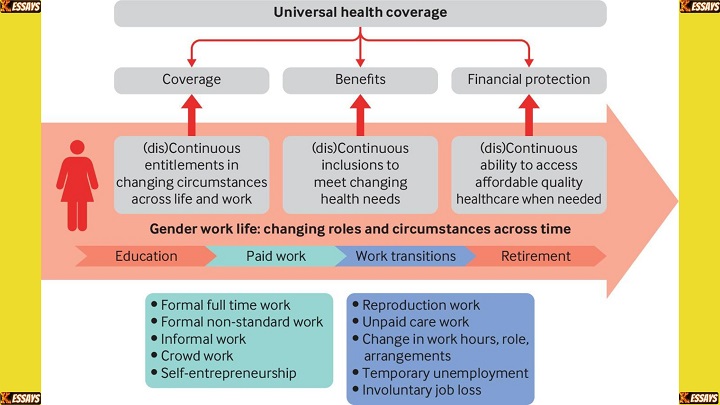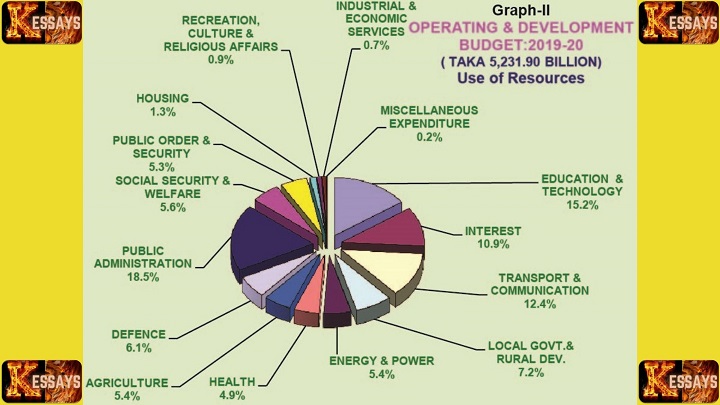Introduction
Healthcare is a fundamental human right that should be accessible to all individuals, regardless of socioeconomic status, geographic location, or personal circumstances. However, millions of people in many parts of the world continue to face significant barriers to obtaining adequate healthcare. "Healthcare for All" embodies the vision of a society where every individual has equitable access to affordable, comprehensive, and high-quality healthcare services. In this essay, we will explore healthcare's importance, its benefits, and the challenges associated with achieving this goal.
I. The Significance of Healthcare for All
1.1. Ensuring Equity and Social Justice
Healthcare for all is essential for promoting equity and social justice within a society. Access to healthcare should not be determined by one's income or social standing but rather based on the principle of equal opportunity. By providing universal healthcare, societies can bridge the gap between the privileged and underprivileged, reducing health disparities and promoting a fairer society.
1.2. Improving Public Health Outcomes
When healthcare services are accessible to all, public health outcomes improve significantly. Early detection and prevention of diseases, along with timely interventions and treatments, lead to better health outcomes and increased life expectancy. Healthcare for all enables individuals to receive necessary medical care in a timely manner, preventing the escalation of minor health issues into more severe conditions.

II. The Benefits of Healthcare for All
2.1. Enhanced Economic Productivity
- Healthcare for all plays a crucial role in enhancing economic productivity within a society. When individuals have access to comprehensive healthcare services, they can maintain optimal health and well-being, allowing them to actively participate in the workforce.
- Healthy employees are more likely to be present at work, experience fewer sick days, and have higher levels of productivity. They are also better equipped to acquire and retain skills, contributing to a more skilled and competitive workforce. Overall, healthcare for all ensures that individuals can lead healthy and productive lives, leading to economic growth and prosperity.
2.2. Reduced Healthcare Costs in the Long Run
Implementing healthcare for all can result in long-term cost savings for individuals, healthcare systems, and societies as a whole. By providing access to preventative care, regular check-ups, and early interventions, healthcare systems can detect and address health issues at an earlier stage. This proactive approach not only improves health outcomes but also reduces the need for expensive treatments and interventions later on.
- For example, identifying and treating chronic conditions early can prevent complications that would require costly hospitalizations or surgeries. By prioritizing preventative care and early interventions, healthcare for all can help reduce the overall burden on healthcare systems and contain healthcare costs in the long run.
- Additionally, healthcare for all promotes a shift from reactive healthcare models to proactive and preventive care. With universal access to healthcare services, individuals can seek medical attention earlier, reducing the likelihood of conditions progressing to more severe stages. This preventive approach saves resources by avoiding the need for costly emergency care or extensive treatments for advanced diseases.
- Furthermore, healthcare for all can help alleviate the financial burden on individuals. By ensuring affordable access to healthcare services, individuals are less likely to delay seeking medical attention due to financial constraints. This can prevent the exacerbation of health conditions and reduce the need for costly emergency care or hospitalizations. As a result, individuals are less likely to face overwhelming medical bills or fall into financial hardship due to healthcare expenses.
In conclusion, healthcare for all offers numerous benefits, including enhanced economic productivity and reduced healthcare costs in the long run. By ensuring universal access to comprehensive healthcare services, societies can promote a healthy and productive workforce, leading to economic growth and stability. Additionally, by prioritizing preventative care and early interventions, healthcare for all can help contain healthcare costs, alleviate financial burdens on individuals, and promote overall well-being. These benefits highlight the importance of striving towards healthcare systems that provide equitable and accessible healthcare for all individuals.
III. Challenges to Achieving Healthcare for All
3.1. Financial Constraints
Implementing healthcare for all poses significant financial challenges, particularly for countries with limited resources. The cost of providing comprehensive healthcare services to an entire population can be substantial, straining government budgets and healthcare systems.
- Low- and middle-income countries, in particular, often face significant budgetary constraints, making it difficult to allocate sufficient funds for universal healthcare coverage.
- To overcome these financial constraints, governments must explore sustainable funding mechanisms. One approach is to establish taxation systems that allocate a portion of the national budget specifically for healthcare. This can be achieved through progressive taxation, where higher-income individuals contribute a greater proportion of their earnings towards healthcare.
- Another option is the implementation of insurance schemes, either through government-managed programs or public-private partnerships. Such schemes pool resources from the population, enabling the provision of healthcare services for all.
International aid and cooperation can also play a crucial role in supporting countries facing financial constraints. Global partnerships and funding initiatives can provide additional resources and technical assistance to help countries establish and sustain healthcare for all programs.
3.2. Infrastructure and Workforce Capacity
Expanding healthcare services to cover all individuals requires a robust healthcare infrastructure and an adequate supply of skilled healthcare professionals. However, many regions, especially rural and underserved areas, lack the necessary healthcare facilities, equipment, and personnel to meet the growing demand for services. Insufficient infrastructure and workforce capacity pose significant challenges in achieving healthcare for all.
- Addressing these challenges necessitates substantial investment in healthcare infrastructure development. Governments need to prioritize the construction and maintenance of hospitals, clinics, and healthcare centers, particularly in underserved areas. This includes ensuring access to essential medical equipment, supplies, and technology necessary for delivering high-quality care. Additionally, efforts should be directed towards improving transportation and communication networks to enhance accessibility, particularly in remote areas.
- Furthermore, healthcare workforce capacity must be strengthened. This involves training and recruiting healthcare professionals, such as doctors, nurses, midwives, and allied health workers, to meet the increased demand for healthcare services.
- Initiatives should focus on attracting healthcare workers to underserved areas through incentives such as financial support for education, professional development opportunities, and improved working conditions. Collaboration with academic institutions and international organizations can facilitate the training and deployment of healthcare professionals in areas with the greatest need.
- While the vision of healthcare for all is commendable, it is not without challenges. Financial constraints and the need for infrastructure and workforce capacity development present significant obstacles in achieving universal access to healthcare. However, through sustainable funding mechanisms, such as taxation and insurance schemes, coupled with international cooperation and assistance, governments can allocate the necessary resources to support universal healthcare programs.
Additionally, investments in healthcare infrastructure and workforce capacity, especially in underserved areas, are vital to ensure equitable access to quality healthcare services. By addressing these challenges head-on, societies can move closer to the realization of healthcare for all, ultimately improving the well-being and quality of life for their populations.

IV. Strategies to Achieve Healthcare for All
4.1. Universal Health Coverage
Implementing universal health coverage (UHC) is a key strategy to achieve healthcare for all. UHC aims to provide essential healthcare services to all individuals without financial hardship. It encompasses a range of services, including preventive, curative, rehabilitative, and palliative care. Governments must work towards establishing comprehensive UHC systems that cover the entire population, ensuring that no one is left behind.
4.2. Health Education and Promotion
Promoting health education and preventive measures can significantly contribute to achieving healthcare for all. By empowering individuals with knowledge about healthy lifestyles, disease prevention, and the importance of regular check-ups, societies can reduce the burden on healthcare systems and foster a culture of proactive health management.
4.3. Primary Healthcare Strengthening
Strengthening primary healthcare is crucial in achieving healthcare for all. Primary healthcare serves as the first point of contact for individuals seeking healthcare services. By investing in primary healthcare infrastructure, training primary care providers, and expanding access to primary care clinics, communities can receive timely and comprehensive care, addressing their healthcare needs effectively.
4.4. Healthcare Workforce Development
Developing and expanding the healthcare workforce is essential to meet the growing demand for healthcare services. This includes training and recruiting healthcare professionals, such as doctors, nurses, and allied health workers, particularly in underserved areas. Governments and educational institutions should collaborate to provide adequate training programs and incentives to attract healthcare professionals to areas with limited access to care.
4.5. Health Technology Advancement
Leveraging advancements in health technology can revolutionize healthcare delivery and improve access for all. Telemedicine, electronic health records, and mobile health applications can enable remote consultations, health monitoring, and access to medical information, particularly in rural and remote areas. Investing in health technology infrastructure and promoting digital literacy can bridge geographical barriers and enhance healthcare accessibility.
4.6. Collaboration and Partnerships
Collaboration and partnerships among governments, healthcare providers, civil society organizations, and international bodies are essential in achieving healthcare for all. Sharing resources, expertise, and best practices can accelerate progress towards universal healthcare. Multilateral initiatives and partnerships can support capacity building, funding, and knowledge sharing, fostering a collective effort towards equitable healthcare access worldwide.
4.7. Health Financing Reforms
Reforming healthcare financing systems is critical to ensure sustainable and equitable healthcare for all. Governments should explore innovative financing mechanisms, such as social health insurance, pooling of resources, and progressive taxation, to generate funds for healthcare services. Effective financial management and accountability mechanisms can ensure that resources are allocated efficiently and reach those in need.
4.8. Community Engagement and Empowerment
Engaging communities and empowering individuals in healthcare decision-making processes are vital to achieving healthcare for all. Communities should be involved in planning, implementing, and evaluating healthcare programs, ensuring that services are culturally appropriate and responsive to local needs. Health literacy initiatives can empower individuals to take charge of their health, leading to better health outcomes.
4.9. Research and Evidence-Based Policy
Investing in research and evidence-based policy development is crucial to guide healthcare systems towards achieving healthcare for all. Research can inform policy decisions, identify health priorities, and assess the effectiveness of healthcare interventions. Governments, academic institutions, and research organizations should collaborate to generate robust evidence and translate research findings into actionable policies and programs.
4.10. Global Solidarity and Health Diplomacy
Healthcare for all is a global challenge that requires international cooperation and solidarity. Countries should engage in health diplomacy, advocating for equitable healthcare access and sharing resources and expertise with nations facing healthcare challenges. Global partnerships, aid programs, and coordinated efforts can contribute to addressing health inequalities and achieving healthcare for all on a global scale.
- Achieving healthcare for all is an ambitious goal that requires a multifaceted approach and sustained commitment from governments, policymakers, healthcare providers, and communities. Strategies such as universal health coverage, health education, primary healthcare strengthening, healthcare workforce development, and leveraging health technology can pave the way for equitable access to healthcare services.
Collaboration, research, community engagement, and global solidarity are integral to addressing the challenges and ensuring that healthcare becomes a fundamental right for all individuals, regardless of their backgrounds or circumstances. By embracing these strategies, societies can work towards building a healthier and more inclusive future for everyone.
V. Countries with Healthcare for All: Achieving Universal Access to Healthcare
While there are several countries that have made significant strides towards achieving healthcare for all, it is important to note that the level of healthcare accessibility and coverage can vary within each country. Here is a list of some countries known for their efforts to provide healthcare for all:
- Canada: Canada has a publicly funded healthcare system known as Medicare, which provides comprehensive healthcare coverage to all Canadian citizens and permanent residents.
- United Kingdom: The United Kingdom has the National Health Service (NHS), which offers healthcare services to all residents of England, Scotland, Wales, and Northern Ireland, regardless of their ability to pay.
- Australia: Australia has a universal healthcare system called Medicare, which provides access to essential medical services, including doctor visits, hospital care, and subsidized medications, for all Australian citizens and eligible residents.
- Germany: Germany has a system of mandatory health insurance known as the Statutory Health Insurance (SHI) system. It provides comprehensive healthcare coverage for all residents, with contributions based on income.
- France: France has a universal healthcare system that provides coverage to all residents through the Assurance Maladie. It offers comprehensive healthcare services, including hospital care, doctor visits, and prescription medications.
- Sweden: Sweden has a publicly funded healthcare system that guarantees equal access to healthcare for all residents. It is funded through taxes and provides comprehensive healthcare services.
- Norway: Norway has a universal healthcare system that provides healthcare services to all residents. The government funds healthcare through taxes, and services are delivered through a combination of public and private providers.
- Japan: Japan has a universal healthcare system that covers all citizens through mandatory health insurance. The system provides comprehensive healthcare services and is funded through premiums and taxes.
- South Korea: South Korea has a universal healthcare system called the National Health Insurance (NHI) program. It provides coverage to all residents, with contributions based on income.
- Netherlands: The Netherlands has a healthcare system that mandates health insurance for all residents. It offers comprehensive coverage, and individuals are required to purchase insurance from private insurers.
It is important to note that the healthcare systems in these countries vary in terms of funding, coverage, and delivery models. While these countries strive for healthcare for all, there may still be challenges and gaps in healthcare accessibility and quality within their systems.

VI. Conclusion
In conclusion, healthcare for all is a fundamental human right and a vital component of a just and equitable society. By ensuring universal access to affordable, comprehensive, and high-quality healthcare services, societies can promote social justice, improve public health outcomes, and enhance economic productivity.
- Although challenges exist, such as financial constraints and infrastructure gaps, strategies like universal health coverage and health education can pave the way towards achieving healthcare for all. It is crucial for governments, policymakers, and stakeholders to prioritize the goal of healthcare for all, as it is not only a moral imperative but also a wise investment in the well-being and prosperity of society as a whole.



Comments are closed!